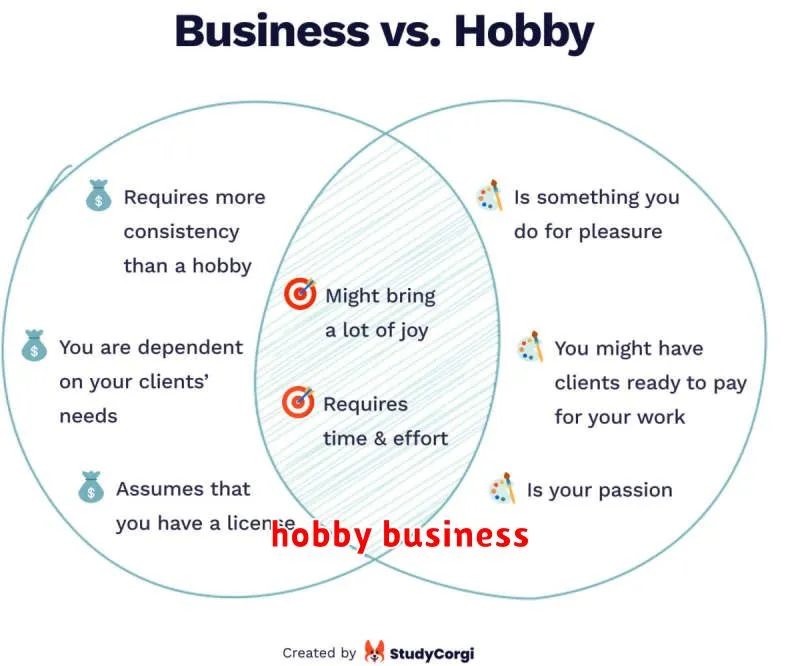Turning your passion into profit is easier than you think! This comprehensive guide, How to Turn Your Hobby into a Profitable Online Business, will walk you through the essential steps to transform your favorite pastime into a thriving online business. Learn how to leverage your existing skills and monetize your hobby, from identifying your target audience and building a strong brand to effectively marketing your products or services online and managing your finances. Discover practical strategies to overcome common challenges and build a sustainable online income stream doing what you love.
Identifying the Market Potential of Your Hobby

Before diving into turning your hobby into a business, thoroughly assess its market potential. This involves researching whether there’s sufficient demand for your hobby-related products or services.
Start by identifying your target audience. Who would be interested in what you offer? Consider demographics, interests, and online behavior.
Next, analyze your competition. Are there similar businesses already operating? What are their strengths and weaknesses? How can you differentiate yourself?
Explore online marketplaces like Etsy or Amazon Handmade to gauge interest in similar items. Look at sales figures, product reviews, and pricing strategies. This provides valuable insight into market demand and pricing possibilities.
Finally, validate your ideas. Conduct surveys or interviews with your target audience to gauge interest in your specific offerings. This feedback can significantly refine your business plan and increase your chances of success.
How to Build an Audience Around Your Passion
Building a loyal audience for your passion-driven business requires a multi-pronged approach. Start by identifying your target audience: who are you trying to reach? Understanding their needs and interests is crucial.
Next, create high-quality content that resonates with your target audience. This could include blog posts, videos, social media updates, or even podcasts, all showcasing your expertise and passion. Consistency is key; regular updates keep your audience engaged.
Engage actively with your audience. Respond to comments, answer questions, and foster a sense of community. Consider running contests or giveaways to boost engagement and attract new followers. Utilize relevant hashtags on social media to increase visibility.
Finally, leverage the power of email marketing. Building an email list allows for direct communication with your most engaged followers, providing updates, exclusive content, and promoting your products or services.
Remember, building a strong audience takes time and dedication. Focus on providing value, engaging authentically, and consistently delivering high-quality content tailored to your audience’s needs.
Monetization Models: Products, Services, Content
Transforming your hobby into a profitable online business requires a well-defined monetization strategy. This involves identifying how you will generate revenue from your passion. Three primary models exist: products, services, and content.
Product-based monetization involves creating and selling tangible goods related to your hobby. This could range from handcrafted items to digital downloads like e-books or templates. Key success factors include high-quality products, effective marketing, and a streamlined sales process.
Service-based monetization focuses on offering your skills and expertise. If your hobby involves photography, for instance, you might offer editing services or photography lessons. Crucial elements are clearly defined service packages, competitive pricing, and excellent customer service.
Content monetization leverages your hobby’s inherent appeal to create engaging content. This could include blogging, creating videos, or podcasts. Revenue streams might come from advertising, sponsorships, affiliate marketing, or selling premium content subscriptions. Success hinges on consistently high-quality content that resonates with your target audience.
Ultimately, the most effective approach often involves a combination of these models. Diversifying your revenue streams reduces reliance on any single source and increases the overall profitability and resilience of your online business.
Creating Your First Digital Product or Offer
Turning your hobby into a profitable online business often starts with creating a digital product or offer. This allows you to leverage your existing skills and passion to generate income without significant upfront investment.
Consider your hobby’s strengths. What unique skills or knowledge do you possess? Are you a talented writer, photographer, graphic designer, or musician? Identifying your core competency is crucial for choosing a product.
Identify your target audience. Who would benefit from your product? Understanding their needs and pain points helps you tailor your offering to their preferences.
Brainstorm product ideas. This could be an ebook, online course, printable templates, stock photos, music tracks, or even coaching services delivered digitally. Consider the ease of creation and potential profitability of each option.
Develop a minimum viable product (MVP). Start with a smaller, simpler version of your product to test the market and gather feedback before investing heavily in a full-scale production.
Pricing is key. Research your competitors to establish a competitive yet profitable price point for your digital product.
Finally, market your product effectively through social media, email marketing, and other online channels. Building an audience before launching is highly beneficial.
Marketing Your Hobby Business on a Budget

Turning your hobby into a profitable online business requires smart marketing, especially on a budget. Focus on organic reach rather than paid advertising initially. This means leveraging free marketing channels.
Social media is your friend. Platforms like Instagram, Pinterest, and Facebook offer free tools to build a following and engage with potential customers. Create high-quality visual content showcasing your products or services. Engage actively in relevant groups and communities.
Content marketing is crucial. Start a blog or create regular posts detailing your craft, process, or tips related to your hobby. This establishes you as an expert and attracts organic traffic.
Email marketing is another effective strategy. Collect email addresses through signup forms on your website or social media. Send out newsletters showcasing new products, promotions, or behind-the-scenes glimpses into your business.
Networking is key. Participate in online and offline events related to your hobby. Collaborate with other businesses or hobbyists to cross-promote each other and reach a wider audience.
Word-of-mouth marketing remains powerful. Encourage satisfied customers to leave reviews and spread the word about your business. Offer excellent customer service to foster loyalty and repeat business.
Remember, consistency is key. Regularly create and share content across your chosen channels to maintain visibility and build a strong online presence. By focusing on these budget-friendly strategies, you can effectively market your hobby business and achieve profitability.
Building a Personal Brand Online
Building a strong personal brand is crucial for turning your hobby into a profitable online business. It’s about more than just selling your products; it’s about establishing yourself as a trusted authority and expert in your niche.
Start by defining your unique selling proposition (USP). What makes you and your hobby different? What problem do you solve for your target audience? Highlight these aspects to differentiate yourself from the competition.
Craft a consistent brand identity. This includes your logo, color palette, fonts, and overall aesthetic. Maintain consistency across all your online platforms to create a cohesive and memorable brand experience.
Engage authentically with your audience on social media and other online channels. Share your passion, expertise, and behind-the-scenes glimpses into your creative process. Building genuine connections is key to fostering loyalty and trust.
Showcase your expertise through high-quality content. Create blog posts, videos, or other materials that demonstrate your knowledge and skills. This will establish you as a go-to resource for information within your niche, driving traffic and establishing credibility.
Finally, monitor your progress and adapt your strategy as needed. Track your key metrics, such as website traffic and social media engagement, to see what’s working and what needs improvement. Continuously refine your approach to optimize your brand’s growth and success.
Tracking Progress and Revenue Goals
Turning your hobby into a profitable online business requires diligent tracking of your progress and revenue goals. This ensures you’re on the right path and allows for necessary adjustments along the way.
Start by setting SMART goals: Specific, Measurable, Achievable, Relevant, and Time-bound. For example, instead of aiming for “more sales,” aim for “increasing sales by 15% in the next quarter.”
Use tools to monitor key metrics. Track website traffic, conversion rates, customer acquisition costs, and, of course, your revenue. Popular options include Google Analytics, spreadsheets, and dedicated business management software.
Regularly review your progress against your goals. This could be weekly, monthly, or quarterly, depending on your business model and growth stage. Identify areas of success and areas needing improvement.
Analyze your data to understand what’s working and what’s not. Are certain marketing strategies yielding higher returns? Are specific products more popular than others? Use this information to refine your approach and optimize your business.
Adapt your strategies based on your findings. If a marketing campaign isn’t performing well, consider adjusting your target audience, messaging, or platform. If a product isn’t selling, consider revising its design, pricing, or marketing angle.
Celebrate milestones! Acknowledging your achievements will keep you motivated and focused on your long-term goals. Consistent tracking, analysis, and adaptation are crucial for turning your hobby into a thriving online business.
Scaling Your Hobby into a Sustainable Business
Turning a hobby into a profitable business requires careful planning and execution. Scaling your operation involves strategically growing your business while maintaining its profitability and sustainability. This requires a shift from casual creation to a more structured approach.
First, analyze your market. Identify your target audience, their needs, and your competition. Understanding your market allows for informed decisions regarding product development and marketing strategies.
Next, optimize your processes. Streamline production, improve efficiency, and consider outsourcing certain tasks to free up your time for strategic planning and growth. This includes refining your product creation, packaging, and shipping methods.
Invest in marketing and advertising. Expand your reach beyond your initial customer base through targeted online campaigns and potentially offline strategies, depending on your product. Building a strong brand identity is crucial for sustained growth.
Manage your finances effectively. Track income and expenses meticulously. Reinvest profits wisely to further improve your products, marketing, and operational efficiency. Seeking professional financial advice can prove invaluable.
Build a strong team, if needed. As your business expands, consider bringing in skilled individuals to handle specialized tasks. Delegation is crucial for sustainable growth, allowing you to focus on higher-level decision-making.
Finally, continuously adapt and innovate. Regularly assess your performance, customer feedback, and market trends to remain competitive and identify new opportunities for growth. Flexibility is key to long-term success.

